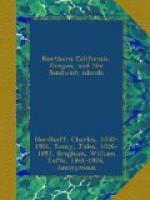From the edge of the Pali or precipice the plain below, which contains about 16,000 acres, looks like an absolute flat, bounded on three sides by the blue Pacific. Horses awaited us at the bottom, and we soon discovered that the plain possessed some considerable elevations and depressions. It is believed to have been once the bottom of a vast crater, of which the Pali we clambered down formed one of the sides, the others having sunk beneath the ocean, leaving a few traces on one side. It has yet one considerable cone, a hill two hundred feet high, a well-preserved subsidiary crater, on whose bottom grass is now growing, while a little pool of salt water, which rises and falls with the tide, shows a connection with the ocean. A ride along the shore showed me also several other and smaller cones.
The whole great plain is composed of lava stones, and to one unfamiliar with the habits of these islanders would seem to be an absolutely sterile desert. Yet here lived, not very many years ago, a considerable population, who have left the marks of an almost incredible industry in numerous fields inclosed between walls of lava rock well laid up; and in what is yet stranger, long rows of stones, like the windrows of hay in a grass field at home, evidently piled there in order to secure room in the long, narrow beds thus partly cleared of lava which lay between, to plant sweet-potatoes. As I rode over the trails worn in the lava by the horses of the old inhabitants, I thought this plain realized the Vermonter’s saying about a piece of particularly stony ground, that there was not room in the field to pile up the rocks it contained.
Yet on this apparently desert space, within a quarter of a century more than a thousand people lived contentedly and prosperously, after their fashion; and this though fresh water is so scarce that many of them must have carried their drinking water at least two or even three miles. And here now live, among the lepers, or rather a little apart from them at one side of the plain, about a hundred people, the remnant of the former population, who were too much attached to their homes to leave them, and accepted sentence of perpetual seclusion here, in common with the lepers, rather than exile to a less sterile part of the island.
When we had descended the cliff, a short ride brought us to the house of a luna, or local overseer, a native who is not a leper; and of this house, being uncontaminated, we took possession.
By a law of the kingdom it is made the duty of the Minister of the Interior, and under him of the Board of Health, to arrest every one suspected of leprosy; and if a medical examination shows that he has the disease, to seclude the leper upon this part of Molokai.
Leprosy, when it is beyond its very earliest stage, is held to be incurable. He who is sent to Molokai is therefore adjudged civilly dead. His wife, upon application to the proper court, is granted a decree of absolute divorce, and may marry again; his estate is administered upon as though he were dead. He is incapable of suing or being sued; and his dealings with the world thereafter are through and with the Board of Health alone.




